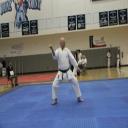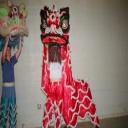Yahoo Answers is shutting down on May 4th, 2021 (Eastern Time) and beginning April 20th, 2021 (Eastern Time) the Yahoo Answers website will be in read-only mode. There will be no changes to other Yahoo properties or services, or your Yahoo account. You can find more information about the Yahoo Answers shutdown and how to download your data on this help page.
Trending News
How important are the traditions and history of the martial arts to you, especially the style you study?
What style of martial arts do you study, and are the traditions of the martial arts and/or your style important to you? And why or why not?
Attention ! Lots of good answers. but answer #25 is not an answer but just advertising a web site. It has nothing to do with my or any martial arts question. Please report it. It is by someone that goes as ?. This is against Y/A rules and really should be stopped.
....
27 Answers
- Anonymous1 decade agoFavorite Answer
I don't think they're very important at all. I mean, this is America, not Asia. I can understand a few things like respect and bowing, but some stuff is just ridiculous and it looks foolish when a bunch of Americans do it. And I HATE it when the instructor makes you call them "sensei" and say certain terms Japanese/Korean/whatever. I mean again, this is America. And I don't mean to seem like America is all high and mighty in comparison with every other country. But if one were to do something american in Japan (though I can't think of what that would be) they wouldn't say things in English. And I speak Japanese somewhat fluently and a little Korean and I've had some experiences where they say the wrong terminology or butcher the pronunciation and tell me I'm saying it wrong. Sorry if I offend anyone, that's just how I feel. I do Tang Soo Do and Muay Thai by the way.
- Jake LoLv 61 decade ago
It's a matter of personal preference for many, but I do place a heavy emphasis on the traditions and history of any style, even if it isn't taught in the course of regular class.
What was that famous quote from Shakespeare? "What's past is prologue"
We've all taken a glimpse into the past in order to understand our place in the present. Whether it's engaging in an amusingly nostalgic story with our parents or grandparents or traveling to a remote location of some historical importance or even putting up that ol' Xmas tree every December. In one way or another we are all partaking in, repeating some type of tradition that has been passed on or handed down. Why not with martial arts? It seems conceivable that embarking on a journey in the martial arts, just like taking a class at school, should include the foundation or background story. It is an important aspect of training that can provide great insight into the how and why of a particular technique or movement as well as offer a richer overall experience and a breath of inspiration. I would like to think it would be the duty of an instructor to impart some small measure of this in order to create more knowledgeable and better informed students (and future instructors). For if there is no one to carry that tradition or message, then an invaluable portion of the experience is lost.
Of course that's just my two cents. As I've said, this is a matter of personal preference for both teachers and students alike.
Source(s): Muay Thai, Aikido, Wing Chun and others - ?Lv 71 decade ago
Tradition is important for a couple of reasons I think. First understanding it helps better to understand some aspects of most any traditional martial art and appreciate better those aspects in it. You have to remember that some of those aspects are hundreds or even a thousand years old and yet still have meaning and value today. The people that thought of these aspects and formulated them did not have the education, tools and instruments that technology gives us today which makes some of that even more amazing I think.
I also like some of the values that some of these traditions stress and teach and their approach towards that. I think its possible to embrace many of those aspects and yet not be bogged down with tradition or mired in it to the point that you can't tell when a new approach should be considered or contemplated.
This last thing I think is one of the biggest turnoffs for many people though. Inflexibility and short mindedness are usually a big turn-off for many people and I think that's why maybe tradition and some of what that encompasses is not always embraced or respected by some people. Studying Japanese martial arts like I do I have found it advantageous to switch gears so to speak where tradition is concerned. While I don't wear it on my sleeve all the time its important to me and I carry myself with that in mind as well as use and refer to it in teaching my students and making them better more capable martial artists.
Because I also work with and train fighters and others in nontraditional fighting arts I also will make an attempt to give them some of those aspects where tradition is involved so that they can maybe develop a better understanding of some things as well as develop a little more appreciation for it than what they might have had before.
- Shiro KumaLv 61 decade ago
I'm an aikidoka, and IMHO:
Tradition, especially etiquette, is a good way to separate "class time" from "hanging out time." It adds a level of solemnity to training, which helps people take training a bit more seriously. It also serves as a good meeting ground when people from different dojo train together.
History is a good teacher, especially when it comes to the "why" part of the system you're training in. Why the emphasis on, say, joint locks? Why the inclusion of sword techniques? Why do we do kata like this and this? Etc. Quite often, the formal stuff we do in training makes better sense when we look at the historical background of the art.
For example, in aikido, most people will comment on the way uke - especially when training knife defense techniques - will lunge forward when attacking. This, I was told, was a remnant from the days of the samurai, where when facing an armored opponent, you had to aim for the joints between pieces of armor and stab through the thick padding beneath it - thus the lunge. Practically speaking, a good instructor will use this as a sort of introductory attack which is easier for a beginner to handle, and add more realistic attacks later on. But understanding the history behind it, makes you better appreciate the art as a whole - at least you know that some practices, like the lunging attacks, didn't become part of training because the founders of the art didn't know any better.
- How do you think about the answers? You can sign in to vote the answer.
- YmirLv 61 decade ago
I didn't start off on a martial arts system when training. The training itself came from something like JKD, a modern version of a modern version offshoot.
I treat history and traditions as strategy and background knowledge. All the ever true principles in H2H are out there, people just used them differently and cloaked them in various forms or traditions based upon local desires.
Basically, how an instructor teaches H2H or martial arts is most important, but the only way I can objectively assess the relative merits of his training methods is to study historical documents and ancient knowledge on the matter. I cannot say "this is better" or "that is bad" until I have utilized the experience and works of those that have gone before.
Eventually applications may overtake theory or theory overtakes application, and then it's time to reset the balance. I can discover the theory and the knowledge of the ancients, but until I use them and test them out, it won't integrate with practical applications for me. Strong theory, weak applications. Or vice a versa, strong applications but weak theory. The latter tends to place an enforced plateau on improvement. After a person has got as good as he can get and is at a plateau, he either goes out and finds new ideas and challenges or he starts experimenting and seeing if he can innovate something new by himself. Most people have more luck with the former than the latter.
The more I look at how other martial artists work, teach, and practice, the more it doesn't really matter to me what a style is named. I can simply take the practical application direct from theory, bypassing the traditional forms entirely. It may come up as a technique-attack from Tai Chi or Shaolin qong fu or Japanese kenjutsu, but that's because of the knowledge foundation not because the tradition transmitted the techniques to me formally. However, Japanese kenjutsu has hundreds of years of experience to learn from. It's just better to take the knowledge from there, than to figure out all the fine little details on my own.
By understanding the historical roots, I can more objectively assess the strengths and weaknesses of traditional forms and transmission/training methods. Until one can feel the roots of the tree, seeing just the leaves is only half the picture. The context in which forms and traditions were developed, as well as training methodology (very important in the modern sense), are what I look for in history and historical knowledge.
I do not seek simply personal ability but also the ability to teach others in a superior fashion. Obviously training methods must conform to the times, but it is still a task that is as challenging as it was for those of historical times when they had to turn people into fighters on short notice.
- Anonymous1 decade ago
Hey there
I have studied tkd for over 18 years ( two years non affiliated traditional Dojang and sixteen years ITF ) i also for the past two years decided to add onto my training by starting to learn something new and that was Krav Maga which i know has some dodgy poor schools, but i was lucky to find a good instructor and i enjoy learning it and training i find it a useful addition to my martial arts training , but TKD is my main style.
Is tradition and history important to me ? absolutely, in the sense that is it's important to understand where your style came from, the foundation of it, the Philosophy, concept of why it was developed in the first place. I think respecting those traditions is very important in whatever style you do, remember where the style martial art came from, why it was developed and keep that in mind when training and learning, as to not get off track, if that makes sense ?
Knowing the history is important, keeping with the traditions inside the martial arts school also important as it shows respect to the founder, origin of style etc
There is less formality inside the training school with Krav Maga, but there is a focus on where the style came from and why.
In ITF tkd we keep all the traditions, bowing before entering the Dojang, and before leaving, Bowing to the instructor before class begins, a senior student says the tkd oath along with the rest of the class, the tenets of tkd are highlighted often within class which such as integrity, self control, indomitable spirit etc, each pattern form there is history behind the form, and the philosophy of it which must be learned, knowing Korean terms for techniques, counting and commands etc.There is emphasis on history of it and students are often tested on this I think it's important for sure when it comes to the traditional martial arts to keep the traditions, and with any martial art in general knowing the history is important for reason i mention above earlier
Kind regards
eireshane
- Karate DaveLv 61 decade ago
The traditions are there for a reason. It might be to instill the discipline needed to master certain aspects, or to show respect, and various other reasons depending on the tradition being discussed. If you are talking about traditional training drills for instance, they have been proven over time to work, and when you ignore them your skills suffer and refinements that are necessary later are not accomplished. These drills are designed to be part of a whole approach to your training and to work with and compliment the rest of your training.
As far as the history goes, if you don't know where you came from, how can you know where you are headed. What I mean by that is by understanding the history of your art, you get a clearer picture of the ultimate goal that the founders had in mind and the subsequent changes that have been unintentionally and intentionally made. By understanding the circumstances of the environment and social dynamics, you can come closer to how they thought.
Edit: Forgot to mention I currently study Shotokan. I have also studied Chung Do Kwan and Kajukenbo.
Source(s): 29 years MA - LiondancerLv 71 decade ago
To me it is very important and I could write a whole book about why.
In a nutshell....
When I started Karate I did not have very good teachers at first and found it difficult to make things work.I often wondered why and if others had the same problem. I often wondered what the 'original' Karate was like. Yes, now I know there is no such thing as an original style. My third teacher encouraged and taught me how to do research. He told me to go and train with many people and eventually I did. I went from a more tournament karate style to an older more self defense oriented style. I could see the internal power my Okinawan masters had but never taught us. I wanted to learn and ended up in China. One of my Chinese teachers had co-authored a book together with Okinawan masters who traced an old trading route between Okinawa and a tiny village in China where a style similar to the Hakutsuru style of Okinawa was practiced.
First I got into Kung Fu, then Chen Tai Chi and now Chinese martial arts of Wudang. You can see my styles are getting historically older and older and how they evolved yet still fit together is absolutely fascinating. It also helps me to sort through a lot of misconceptions which were born from incorrect translation, limited training time and limited knowlegde of Asian culture, added show and fluff. My training is definitely not about fighting anymore at all.
- Anonymous1 decade ago
Style: Tortal's Clan Pekiti Tirsia
I respect the tradition and history of my style. As for the traditions being important to me. Heck no not really. One of the traditions of my style is being slapped in the face and covered in chicken blood while screaming "Kali!!!!!!!". Now the history is somewhat of importance to me. Knowing the history and understanding it brings me and the style closer. Now Pekiti tirsia is apart of my life. It's who I am. I can't go a day without practicing. Even if my girl wants to go out somewhere I'd rather go somewhere quiet with my dagger and stick and practice till night falls.
As for the traditions of other arts being important to me nope, but I respect it like any noble martial artist would.
- callsignfuzzyLv 71 decade ago
I'm an historian. The history parts are, I would say, a subject of great interest, though I wouldn't call them "important" in that, without them, my practice wouldn't change that much. While knowing historical trivia is really neat, it almost never has an impact on perfecting the mechanics of a technique. At best, it gives context for how the technique was originally used. But, I've always liked history and love learning more. Since I've been through an academic environment, I've come to view the "history" of martial arts with a very skeptical eye. A lot of what gets perpetuated as unquestionable history has little or no historic record to back it up. So as an historian I find a lot of the history difficult to swallow, but still muddle through it in an effort to do what I've gone to school to learn how to do: discover as much historical truth as possible.
Traditions don't mean much to me and in some cases I think they're even detrimental. I'm all about the pragmatic application of martial arts. While in some cases, I don't believe tradition has an effect on that pragmatism (bowing/saluting, for example) and may have a beneficial effect on occasion (standardized language for techniques), many of the cultural traditions, especially Asian ones, can lead to less-than-optimum results. For example, the idea of not questioning ones higher ups is often taken to the extreme, and people have been kicked out of some classes for asking ANY question (ex: "how does this work in a real fight?") or doing what their conscience dictates instead of towing the line. Part of it might not be strict tradition, but rather a cultural difference; the West tends to be more democratic, which the ancestor worship/Confucian-influenced culture of the East is almost militaristic in its hierarchical structure. Having served in the military myself, I can say that's not necessarily a bad thing, but I think it can be blown out of proportion when the systems themselves are taught in the West. People are (usually) signing up to learn how to defend themselves and I don't think it's necessary to put them through boot camp. Yes, respect and listen to the people in charge, but I see no reason why adults should be treated like kids in a military school. Long way of saying, I could do without traditions that are detrimental to actually learning the practical side of the martial art.
- WannabeGracieLv 41 decade ago
I do Brazilian Jiu-Jitsu.
And yes! They are important for me, although where I train we don't really learn too, too much about the traditions and history of JJ/BJJ, I like to read books and research it myself on the internet. Like I said, where I train is not so concerned about how you tie your belt or whether you forgot your gi and have to roll without one. Some classes we actually do no gi Jits. But I take it upon myself to tie my belt the traditional way as well as roll with the gi as often as I can, just because I feel like more of a traditional, authentic martial artist with it on, maybe I'm crazy haha.
Although I do BJJ, I love to research other martial art styles as well, that's part of the reason I'm on Yahoo answers a lot (MA section)! I have friends in other martial arts (mostly karate/Judo) and I love to talk to them about their respective styles as well. I feel the more I know about the Martial Arts and especially my one in particular, the better I can become.
I also think that a lot of dojo's should teach more about the history and the tradition of the martial art they teach (presuming the instructor actually knows anything), I think it's important to learn, just like it's important to learn about your heritage! But unfortunately a lot of places don't seem to do that as much.
^_^
Source(s): Brazilian Jiu-Jitsu <3












